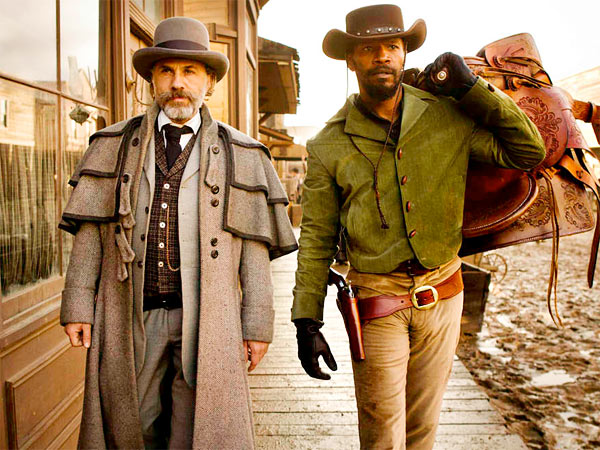Django Unchained Review

Tarantino's latest offering Django Unchained has been met with vast praise so far, including being nominated for an Oscar. I'm not so sure I agree.
All of the actors were superb, with Jamie Foxx playing the title role and Christoph Waltz unsurprisingly nominated for an Oscar for his performance as bounty hunter Dr King Schultz. The two make a great pairing and have excellent chemistry. Leonardo diCaprio also gives a dedicated and eerily believable performance as slave-owner Calvin Candie. Django's relationship with Broomhilda is refreshing, given the scarcity of loving black relationships seen in Hollywood films.
The cinematography was excellent as usual, dealing unflinchingly with the scenes of violence Tarantino is famous for. Speaking of cinema violence, I am glad that he did not avoid the subject of the violence against slaves.

The script had some real gems of dialogue in it, and Waltz especially made them sparkle with his delivery. Foxx also has some excellent lines, especially when he is playing up to his role as Dr Schultz's business partner in mandingo fighting.
With that said, onto the bad. Kerry Washington as Broomhilda is chronically underused; she has maybe twenty lines at best, and spends most of her time on screen being mocked, threatened, or otherwise tortured. She serves as a plot device for Django to rescue and little else, which is surprising, since Tarantino often writes women characters very well (The Bride comes instantly to mind). Perhaps it's just because the film is nominally a Western, but even so, it grates on me.
Samuel L. Jackson plays Stephen as a fairly straight Uncle Tom out of a minstrel show. Whether Tarantino meant this to be satirical or not is largely irrelevant, since the audience I was in laughed unironically at almost every line. However, I doubt that a satire on racist stereotypes is intended, mostly because Samuel L. Jackson is put in blackface to play this role (I honestly have no idea why) and there is no examination of why a black slave might feel the need to act so servile. He is simply portrayed as a conniving villain who deserves the death that he gets.
As for the few other black characters, they are blank slates that seem to only be there to reflect how extraordinary Django is. There is an ongoing theme of Django as an "exceptional n***er", and that seems to be essentially how the film portrays him. There is a scene near the end which I found incredibly unbelievable - Django makes his escape in a rather explosive manner, leaving three chained slaves behind. Instead of saying "Why don't you unchain us instead of leaving us in the desert to die?", they just smile. If this is meant to be an indicator of hope, it's a condescending one, particularly given the way Django treats other slaves in the movie.
Then there is the overall tone of the film. It cannot decide whether it wants to be a serious comment on the realities of slavery, a satire on racist attitudes, or an ultra-violent revenge-fest with guns. It ends up being none of these, making the film seem disjointed. It is also far too long by about twenty minutes.
Granted, it could have been a lot worse, but it also could have been a lot better. I did not leave feeling entertained or enlightened or in any way happy to have seen it. I felt as if my history had been chewed up and spat out for cheap shocks and laughs, with none of the originality that Tarantino has displayed in his other films and many possibilities missed. Most of the other people I have spoken to would recommend it, but personally, I wish I hadn't seen it. 4/10
Helen Gould

